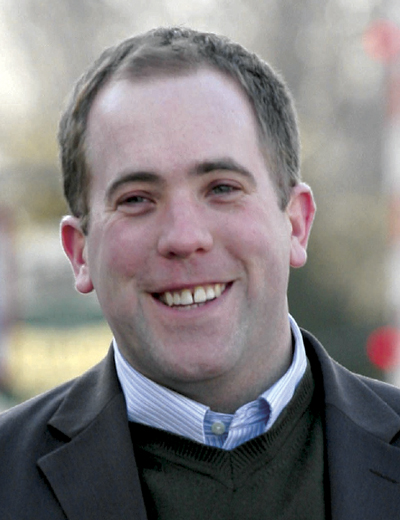AUGUSTA — Better managing the placement of mentally ill criminals in the city, making sure natural gas is offered in the area and ensuring that early childhood programs get the money they need are all issues local lawmakers plan to tackle during the upcoming legislative session.
Lawmakers elected last month — all 186 of them — will arrive at the Capitol on Wednesday to be sworn in and will choose the new attorney general, treasurer and secretary of state. The day-to-day work will begin in January, when the Legislature reconvenes for what’s traditionally a six-month session.
“Our job is to seek common ground with the governor and find ways to move the economy forward in the next two years,” said Rep. Seth Berry, D-Bowdoinham, the House majority leader.
After two years of Republican rule, Democrats took back the House and the Senate, and they will need to work with Republican Gov. Paul LePage to advance their goals. In addition to Berry, two other central Maine Democrats will be in leadership positions for the coming session. Sen. Seth Goodall of Richmond is Senate majority leader, and Rep. Jeff McCabe of Skowhegan is assistant House majority leader.
Local Republicans in leadership — House Minority Leader Ken Fredette of Newport, Senate Minority Leader Michael Thibodeau of Winterport, and Assistant Senate Minority Leader Roger Katz of Augusta — say the budget and the economy will be foremost on their agendas.
“I think one of the issues we’re looking at is the build-out of the natural gas system,” Thibodeau said. “I see that as absolutely essential to the success of small business in central Maine.”
Following a flawed bidding process over the summer, state efforts to award a natural gas contract for state government buildings have stalled. But two companies, Maine Natural Gas and Summit Natural Gas of Maine, are moving forward to provide some service to the area.
Katz, a former Augusta mayor, said he wants to find a way to require the state to share more information with the city when it comes to placement of mentally ill criminals. In August, city officials were surprised to learn from a Kennebec Journal story about a state plan to place in local housing mental health patients who have committed violent acts. Known as forensic patients, many of the criminals have been found not responsible for serious offenses such as murder.
“We need to make the state more sensitive to the concerns of the citizens of Augusta with regard to forensic patients,” Katz said.
Berry, who is beginning his final two years in the House, said his priority is early childhood education. Budget cuts instituted in the last two years reduced funding for Head Start and money for a home visitation program for new parents.
“There’s so many great things both those programs do,” he said. “There is some bipartisan interest there.”
Berry said he wants to slow down the process for approving charter schools and increase state funding for public education to 55 percent, which is required by a voted-adopted 2004 state law. Lawmakers have yet to reach the 55 percent threshold.
On other fiscal fronts, Berry wants to advance “a significant bond package” to help create jobs and continue work on the state’s tax structure to make it more fair to middle-income families.
Central Maine lawmakers have been chosen by their peers to fill six of the 10 House and Senate leadership positions.
In addition to helping to control the flow of legislation, leaders serve on the Legislative Council, which makes policy and spending decisions for the legislative branch of government.
McCabe said he wants to further efforts to get local schools and other places to serve locally grown food, which may include updating kitchens to handle whole food and increasing freezer or refrigerator space to store it. As a former member of the Agriculture, Conservation and Forestry Committee, McCabe said he’s interested in finding a way to bring more slaughterhouses to the state and addressing regulatory issues that are preventing the whitewater rafting industry from growing.
As majority whip, McCabe also will be coordinating efforts to train new Democratic members. Of the 89 House Democrats, about 40 have never served in the Legislature. The Republicans have 58 members, 12 of whom have no prior legislative experience. The House will have four unenrolled members, meaning they are not Republicans or Democrats.
Fredette, who served on the Appropriations Committee last term, said his biggest focus will be on the budget. LePage will need to offer a supplemental budget to fill holes in the current budget and propose a new two-year budget that will run July 1 through June 30, 2015.
Fredette said while political rhetoric is part of any legislative session, he hopes it is kept to a minimum.
If Democrats overreach, LePage can serve as a check on the legislative branch because Democrats don’t have a supermajority to override his vetoes without Republican support.
“We sort of have the governor there as a backstop,” Fredette said.
Goodall said Democrats, who hold a 19-15-1 Senate majority, will focus on improving workforce development opportunities.
“Many people are ready and wanting to go back to community college, but there’s not enough space,” he said. “Our job training programs are not as aligned (with business needs) as they should be.”
Goodall said he has an interest in wind power as an area of growth and he wants to continue to help downtowns improve, citing Bath and Richmond as success stories.
Katz said he wants to stabilize funding to cities and towns by shoring up the Municipal Revenue Sharing system, through which the state returns a portion of tax proceeds to cities and towns.
He’s also interested in taking a systematic look at welfare programs to make sure they are working. Three other bills Katz may sponsor would focus on finding a way to collect sales taxes from items purchased over the Internet, enhancing cellphone privacy and requiring state regulators to help applicants find a way to comply with state rules.
When it comes to cellphones, Katz would like to require police to get a warrant if they want cellphone records. Some cellphone companies now will give up records on demand, and others ask for a warrant.
While there would be exceptions for cases of missing children and elderly people, or for criminal investigations, Katz said in general, he wants to ensure the privacy of cellphone users who may or may not know there’s a GPS device in their phones.
“This is another example of the law needing to catch up with technology,” he said.
Susan Cover — 621-5643
scover@mainetoday.com
Send questions/comments to the editors.





Success. Please wait for the page to reload. If the page does not reload within 5 seconds, please refresh the page.
Enter your email and password to access comments.
Hi, to comment on stories you must . This profile is in addition to your subscription and website login.
Already have a commenting profile? .
Invalid username/password.
Please check your email to confirm and complete your registration.
Only subscribers are eligible to post comments. Please subscribe or login first for digital access. Here’s why.
Use the form below to reset your password. When you've submitted your account email, we will send an email with a reset code.